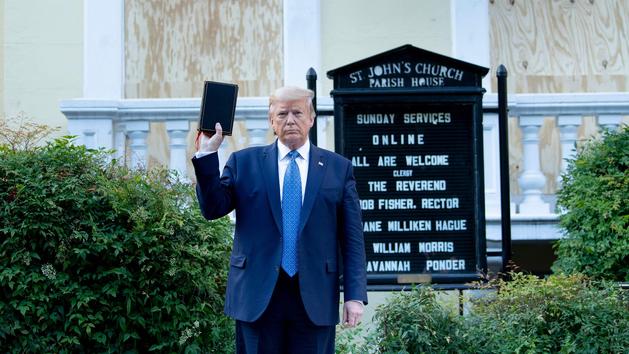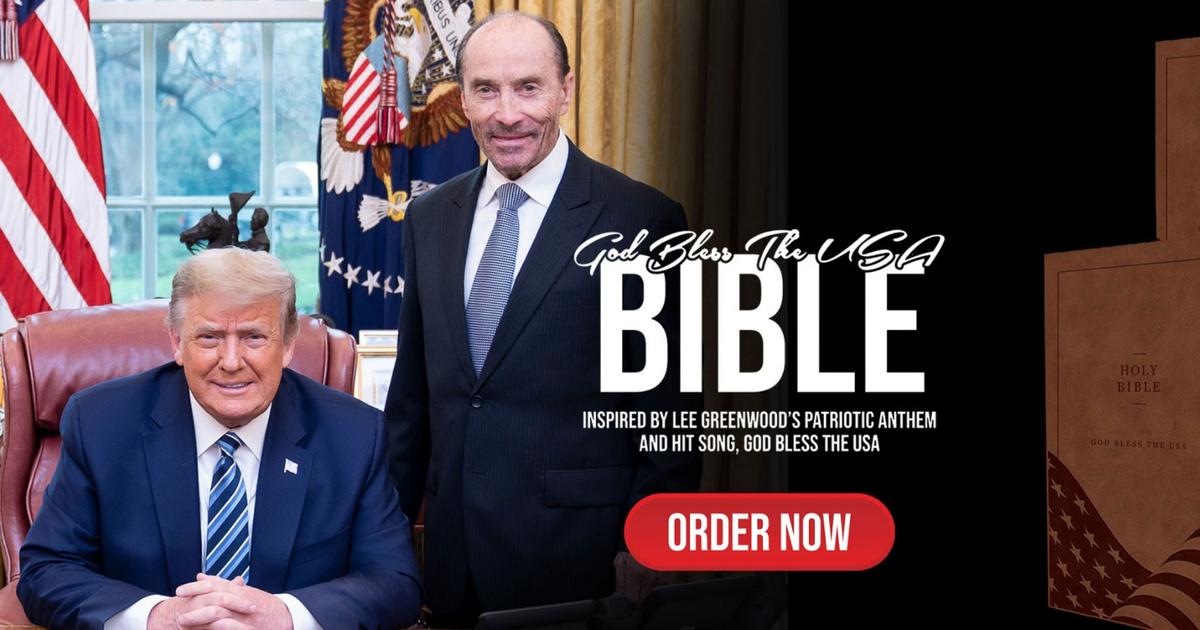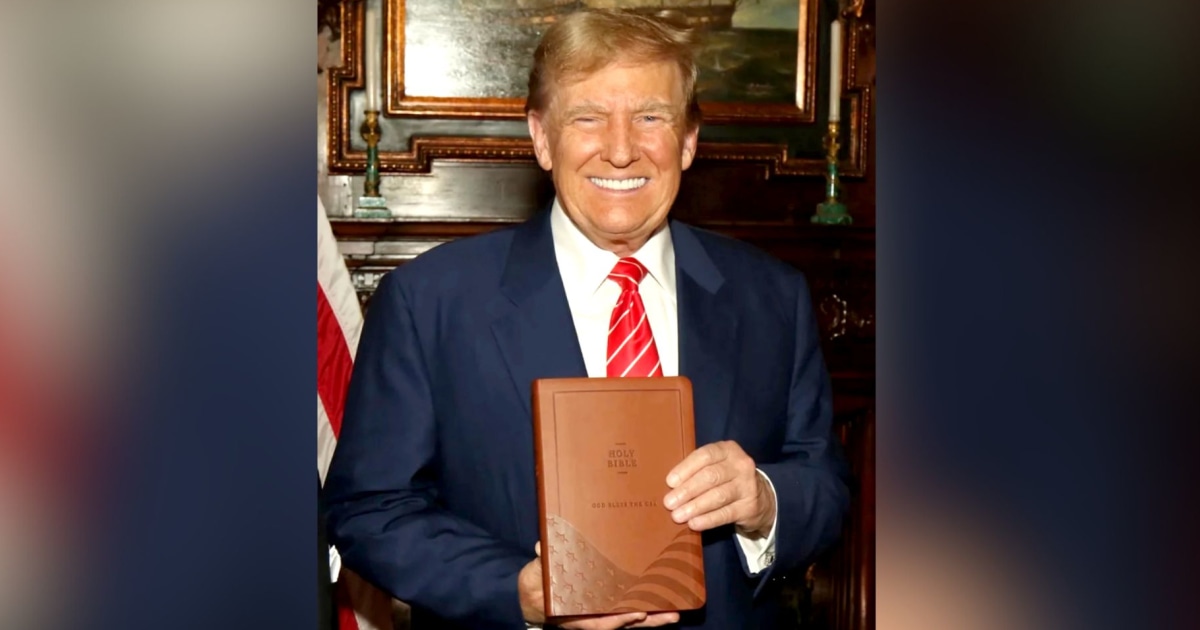Donald Trump's surprise visit to St John's Church in Washington on Monday evening continues to spread ink. Monday evening, while several demonstrators are gathered peacefully in front of the White House, reinforcements of "military police" arrive. Tear gas disperses the crowd. What is going on ? Now the President of the United States is walking out of the White House. He crosses the square and goes in front of St John's Church, a building belonging to the American Episcopalian Church (heir to Anglican Christianity), where a start of fire was observed the day before, while the city was in the grip of riots after the death of the African-American George Floyd, during a police arrest. In front of the live cameras, he brandishes a Bible, then poses in front of the photographers with his Ministers of Defense, of Justice and his Chief of Staff.
Read also: United States: protesters return to the White House
"It was traumatic and deeply insulting in the sense that something sacred was diverted for a political posture ," she then denounced on public radio NPR.
But what exactly did Donald Trump mean by this symbolic gesture, when his country has been plagued by the worst riots against police violence against blacks since 1968?
Read also: Our report in Minneapolis, in the epicenter of the riots that ignite the United States
Send a message to its evangelical electoral base
The political dimension of this gesture is not difficult to detect: the presidential election on November 3 is fast approaching. However, the American evangelicals, but also a part of the Protestants and the conservative Catholics, constitute a powerful electoral base for Donald Trump. In 2016, 81% of evangelicals and 52% of Catholics had voted for him.
"This communication operation was aimed at conservative Catholic circles, which form, with the evangelicals, the heart of Trump's electorate," thus deciphers the sociologist Philippe Gonzalez, specialist in evangelicals and author of Let your kingdom come. Evangelicals tempted by absolute power (Labor and Fides editions). This staging was probably brought to him by one of his many advisers from the conservative Christian right. The idea could even come directly from the evangelical pastor Paula White, influential adviser to Religious Affairs of the president ...
Read also: United States: Paula White, the televangelist who signed a pact with Trump
Besides, Trump did not stop there. The next day, Tuesday June 2, the president continued his operation to seduce conservative Catholics at the Saint John Paul II National Shrine, in northeastern Washington. A move strongly criticized, this time by the American Catholic episcopate. "I find it disconcerting and reprehensible that a Catholic site allows it to be hijacked and manipulated in such a flagrant manner (and) that violates our religious principles," sharply criticized the archbishop of Washington, Wilton Gregory, in a press release .
Legitimize the use of force as "divine will"
But let's go back to Monday June 1st. A few hours earlier, in a very martial speech, Trump promising "law and order" , called on the national guard to "dominate the streets" and denounced the riots as acts of "internal terror" . Before adding: "killing innocent people is a crime against humanity and against God" , thus equating riots with opposition to the divine will.
From then on, displaying the Bible by hand in this St John church, also nicknamed "the church of presidents", is not trivial. "This staging aimed at the ideal of the Christian right, according to which any authority which governs us would have been established by God" , explains André Gagné, full professor at Concordia University of Montreal (Canada), specialist of the religious right in the USA.
This researcher and sociologist Philippe Gonzalez even see in this communication operation an implicit reference to chapter 13 of the epistle to the Romans of Saint Paul where the latter calls Christians to be "subject to the higher authorities, because there is no 'authority only in dependence on God '. Likewise, this passage legitimizes, for the evangelicals, the recourse to the force of the State as resulting from a divine will: “indeed, it is not for nothing that authority holds the sword. For it is in the service of God, ” writes Saint Paul.
"Dispersing demonstrators with the use of force and then brandishing the Bible in front of this" junk "church, for Trump and his electorate - the liberal Episcopalian Church authorizes LGBT marriage - is a way of declaring that the order and law are based on the Bible ” , continues Philippe Gonzalez.
Trump gives evangelicals full satisfaction: they would like the law of the Republic to be inspired by the Word of God, the Bible to be the source of the law
Mokhtar Ben Barka, professor of civilization and history of the United States, specialist in evangelicals.In this way, "Trump gives evangelicals full satisfaction," adds Mokhtar Ben Barka, professor of civilization in the United States and specialist in evangelical Protestantism at the Polytechnic University of Hauts-de-France (UPHF). "They would like the law of the Republic to be inspired by the Word of God, that the Bible is the source of the law, which is extremely dangerous because we would fall into a theocracy, contrary to the American constitutional spirit" , continues Professor Mokhtar Ben Barka.
Posing as a defender of religious freedom
A few months before the presidential election, Trump therefore galvanizes his evangelical electoral base which, underlines Mokhtar Ben Barka, “considers him as an elected representative of God: in the media, he is thus assimilated to a kind of Messiah of the Old Testament " . In this Guardian report, a faithful evangelical also compared Trump's visit to St John's church to “Joshua's March” in the Bible, and described him as a “president wearing the armor of God” .
Read also: For evangelical Christians, Trump is a "new Cyrus"
The symbolism of the gesture of the American President could go even further, according to Mokhtar Ben Barka: "Trump also poses as a candidate for religious freedom: by posing in front of a church which has suffered the prey of laziness, he says: '' look, I will prevent other churches from experiencing the same fate '' ”. Besides, Trump signed the decree concerning religious freedom in the world the following day, notes the professor.
The unresolved racial question among evangelicals
Has Trump's media campaign been effective with his electoral base? It seems so, to read the tweet from Franklin Graham, who is none other than the son - much more politicized than his father - of evangelical pastor Billy Graham, who federated evangelicals in the 1940s in the United States. "God and his Word are the only hope for our nation," he wrote to comment on Trump's removal to St John's church.
How to explain such a success on the part of a large part of the conservative American Christian right? "Originally, the Christian right in the United States was focused, even before the question of abortion - on which Trump was mobilized, Editor's note - , on the question of racial segregation" , underlines the sociologist Philippe Gonzalez , who cites a striking example: “Two years ago, a declaration on racism at the Synod of Evangelical Baptists in the South aroused much debate. The cleavage between Baptists in the South and Baptists in the North is based on the abolition of slavery in the 19th century: the very history of these church families remains thus marked by the racial question ”.







/cloudfront-eu-central-1.images.arcpublishing.com/prisa/OV2VBR4SENF6HBYT4PL7REJMVU.jpg)



/cloudfront-eu-central-1.images.arcpublishing.com/prisa/KMEYMJKESBAZBE4MRBAM4TGHIQ.jpg)


